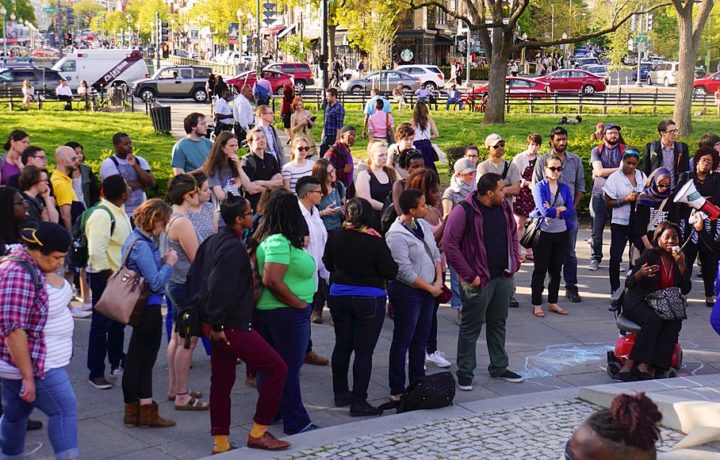Image Credit: tedeytan / CC BY-SA (https://creativecommons.org/licenses/by-sa/2.0)
May 16, 2020, marked the ten-year anniversary of the violent death of Aiyana Stanley-Jones, a seven-year-old black girl fatally shot in the head by a white police officer during a raid gone tragically wrong in Detroit. Officer Joseph Weekley’s first trial ended in a hung jury, and a judge eventually dismissed the charges against him after a second trial in 2014. Last year the city settled with Aiyana’s family for $8.25 million.
That the ten-year-anniversary of Aiyana’s death passed largely unacknowledged, on top of the delayed outrage over the death of Breonna Taylor, the young black first responder who was shot dead by police as they barged into her home on March 13, 2020, serves as another painful reminder of how little black women’s and black girls’ lives matter.
In the years since Aiyana’s untimely death, the number of black women and girls either killed by police or that have died in police custody has grown to include: Tanisha Anderson, Yvette Smith, Rekia Boyd, Natasha McKenna, Sandra Bland, Kindra Chapman, Kimberlee Randle-King, Joyce Curnell, Ralkina Jones, Kayla Moore, Gynnya McMillen, and Korryn Gaines. Their deaths are compounded by the experiences of those black women who have been punished for attempting to defend themselves. Black women like Marissa Alexander, who was initially sentenced to twenty years for firing a warning shot as her abusive partner (a man against whom she had restraining order) advanced, and CeCe McDonald, who was imprisoned after defending herself against a racist, transphobic attack in Minneapolis in 2011.
The 2015 case against an Oklahoma City police officer, Daniel Holtzclaw, further maps the breadth of state violence against black women. The half-white and half-Asian officer was charged for sexually assaulting thirteen black women. The tireless activism of OKC Artists for Justice and other local civil rights groups that mobilized on the ground and through social media helped bring the case to light. Yet even as Holtzclaw was fired from the force and tried before an all-white jury (itself an outrageous throwback to Jim Crow justice), most national media barely took notice. Not until Holtzclaw was actually convicted did the country pay attention. Even then, it seemed less about black women having been targeted and violated by a law enforcement officer and more the result of genuine shock that Holtzclaw would actually be punished for it. And let us not forget: he was convicted of only a fraction of the original charges.
Press images of Holtzclaw crying about the verdict went viral. His feelings took center stage, rather than the emotions of the brave black women victims who came forward. Among them were Jannie Ligons (58), Carla Raines (45), Sherry Ellis (39), and a seventeen-year-old black girl whose DNA was found inside Holtzclaw’s uniform pants.
Many of us know that a virulent historical thread runs through all of this carnage. The devaluation of black women’s and girls’ lives is deeply embedded in the marrow of American justice. The same legal system that birthed the nation also set in place laws and practices that rendered black women chattel, excluded black women from judicial protection, and simultaneously sanctioned brutality and sexual violence against black women. We can point to colonial statutes that carried stiff sentences for the rape and attempted rape of white women and white girls, while failing to criminalize the rape or attempted rape of black women and black girls. We can cite the long history of black women being starkly overrepresented in prisons and penitentiaries across the country as well as across time and space. And we can talk about how black women and black girls have received and continue to receive harsher sentences than white women and white girls for the same infractions.
#SayHerName and call attention to this history to support the ongoing urgent protests in the wake of the deaths of Ahmaud Arbery and George Floyd and precious Breonna Taylor. The experience of black women and black girls must be fundamentally addressed as America wrestles with national and international demands for justice and an end to state sanctioned anti-black violence.
Kali Nicole Gross is Martin Luther King, Jr. Professor of History at Rutgers University and co-author, with Daina Ramey Berry, of A Black Women’s History of the United States (Beacon 2020). She is Publications Director of the Association of Black Women Historians. Follow her on Twitter @KaliGrossPhD.
